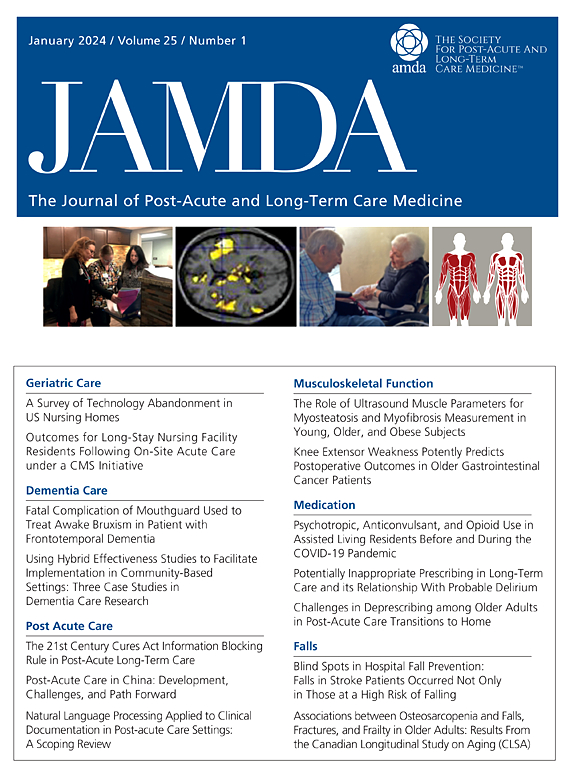The Effects of Commercial Conversational Agents on Older Adults’ Mental Health: A Scoping Review
IF 4.2
2区 医学
Q2 GERIATRICS & GERONTOLOGY
Journal of the American Medical Directors Association
Pub Date : 2025-04-14
DOI:10.1016/j.jamda.2025.105523
引用次数: 0
Abstract
Objectives
With increasing life expectancy, more older adults are experiencing poor mental health because of the significant life transitions they face. Commercial conversational agents (CAs) are emerging devices that can potentially support older adults' mental well-being. However, limited literature has evaluated the influence of commercial CAs on older adults' mental health. This study aims to examine what is known about the effects of commercial CAs on older adults’ mental health and the associated features.
Design
This scoping review was conducted in accordance with Arksey and O'Malley's framework.
Setting and Participants
The review primarily focused on community-dwelling older adults aged 60 and above who used any commercial CAs.
Methods
Quantitative, qualitative, mixed-method peer-reviewed studies and dissertations were included. Eleven databases were searched for relevant articles published from January 1, 2010, until April 9, 2024. Data extracted included the author(s), year, country, objective, population details, eligibility criteria, study design, commercial CA type, and findings related to research questions. Inductive basic content analysis was used for data synthesis.
Results
Twenty-nine articles from 28 studies (n = 1017 older adults) were included. Five categories were synthesized: social wellness, emotional reactions, cognitive stimulation, autonomy, and depression. Common features impacting older adults' mental health were the CAs' conversational capacity and anthropomorphism, voice-activated functions, music, calling and other functions, and technological limitations. There were more positive than adverse effects on older adults’ mental health categories.
Conclusion and Implications
Commercial CAs can potentially mitigate mental health in older adults, but the evidence is still very preliminary. Their effects must be verified in randomized controlled trials using objective and validated tools and through mixed-method studies.
商业会话代理对老年人心理健康的影响:范围综述
目标:随着预期寿命的延长,越来越多的老年人由于面临重大的生活转变而精神健康状况不佳。商业会话代理(ca)是一种新兴的设备,可以潜在地支持老年人的心理健康。然而,有限的文献评估了商业ca对老年人心理健康的影响。本研究旨在研究商业ca对老年人心理健康的影响及其相关特征。设计:根据Arksey和O'Malley的框架进行范围审查。环境和参与者:本综述主要集中在社区居住的60岁及以上使用任何商业ca的老年人。方法:包括定量、定性、混合方法的同行评议研究和论文。检索了从2010年1月1日至2024年4月9日发表的相关文章。提取的数据包括作者、年份、国家、目的、人群详细信息、资格标准、研究设计、商业CA类型以及与研究问题相关的发现。采用归纳基本内容分析法进行数据综合。结果:纳入了来自28项研究的29篇文章(n = 1017名老年人)。综合了五个类别:社会健康、情绪反应、认知刺激、自主性和抑郁。影响老年人心理健康的共同特征是ca的会话能力和拟人化、声控功能、音乐、呼叫和其他功能以及技术限制。对老年人心理健康的正面影响大于负面影响。结论和意义:商用ca可以潜在地缓解老年人的心理健康,但证据仍然非常初步。它们的效果必须在随机对照试验中进行验证,使用客观和有效的工具,并通过混合方法研究。
本文章由计算机程序翻译,如有差异,请以英文原文为准。
求助全文
约1分钟内获得全文
求助全文
来源期刊
CiteScore
11.10
自引率
6.60%
发文量
472
审稿时长
44 days
期刊介绍:
JAMDA, the official journal of AMDA - The Society for Post-Acute and Long-Term Care Medicine, is a leading peer-reviewed publication that offers practical information and research geared towards healthcare professionals in the post-acute and long-term care fields. It is also a valuable resource for policy-makers, organizational leaders, educators, and advocates.
The journal provides essential information for various healthcare professionals such as medical directors, attending physicians, nurses, consultant pharmacists, geriatric psychiatrists, nurse practitioners, physician assistants, physical and occupational therapists, social workers, and others involved in providing, overseeing, and promoting quality

 求助内容:
求助内容: 应助结果提醒方式:
应助结果提醒方式:


